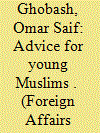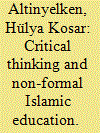|
|
|
Sort Order |
|
|
|
Items / Page
|
|
|
|
|
|
|
| Srl | Item |
| 1 |
ID:
149636


|
|
|
|
|
| Summary/Abstract |
Saif, the elder of my two sons, was born in December 2000. In the summer of 2001, my wife and I brought him with us on a visit to New York City. I remember carrying him around town in a sling on my chest. A few days after we got back home to Dubai, we watched the terrible events of 9/11 unfold on CNN. As it became clear that the attacks had been carried out by jihadist terrorists, I came to feel a new sense of responsibility toward my son, beyond the already intense demands of parenthood. I wanted to open up areas of thought, language, and imagination in order to show him—and to show myself and all my fellow Muslims—that the world offers so much more than the twisted fantasies of extremists [1]. I’ve tried to do this for the past 15 years.
|
|
|
|
|
|
|
|
|
|
|
|
|
|
|
|
| 2 |
ID:
181147


|
|
|
|
|
| Summary/Abstract |
Critical thinking is a highly valued skill in the twenty-first century, and its incorporation into formal school curricula as a core skill is nearly ubiquitous globally. It is considered imperative for educational quality, employability, competitiveness, and for promoting democratisation and social integration. While schools are tasked to promote critical thinking, non-formal Islamic education (NFIE) provided by mosques or by private organisations or tutors is often criticized for its emphasis on rote learning and memorisation, and for fostering an uncritical acceptance of authority. Based on interviews with 27 young adult alumni from four different Muslim communities in the Netherlands, this study seeks to explore the pedagogy of NFIE, with a focus on critical thinking. The accounts of young adults revealed that an emphasis on stimulating critical thinking was largely absent, and there were limited opportunities for interactions, questions, debating or challenging the authority of religious educators or Islamic texts. The traditional pedagogical approach, discouraging attitudes of educators and peers, lack of language proficiency, the young age of learners, and a perceived lack of need for critical deliberations were identified as key challenges. Young adults called for reforming the pedagogy of NFIE to allow for more reflexive, inquisitive and dialogical learning. Some argued that lack of critical deliberation would lead to weakness in the belief structures and faith of new generation Muslims in Europe, resulting in a sense of confusion and disorientation, and limited embodiment of Islamic principles.
|
|
|
|
|
|
|
|
|
|
|
|
|
|
|
|
|
|
|
|
|